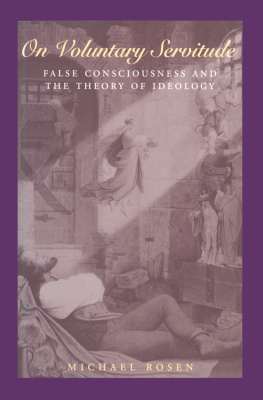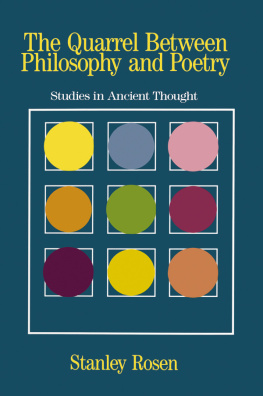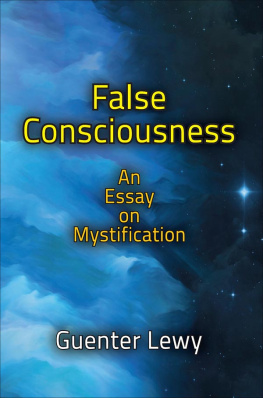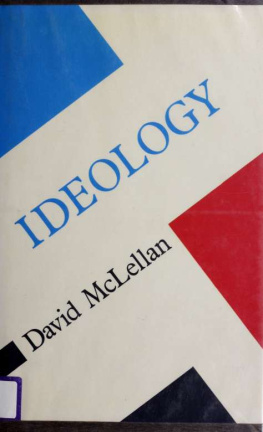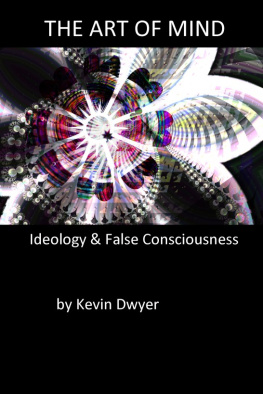Rosen - On voluntary servitude: false consciousness and the theory of ideology
Here you can read online Rosen - On voluntary servitude: false consciousness and the theory of ideology full text of the book (entire story) in english for free. Download pdf and epub, get meaning, cover and reviews about this ebook. City: Cambridge, year: 1996, publisher: Wiley;Polity Press, genre: Religion. Description of the work, (preface) as well as reviews are available. Best literature library LitArk.com created for fans of good reading and offers a wide selection of genres:
Romance novel
Science fiction
Adventure
Detective
Science
History
Home and family
Prose
Art
Politics
Computer
Non-fiction
Religion
Business
Children
Humor
Choose a favorite category and find really read worthwhile books. Enjoy immersion in the world of imagination, feel the emotions of the characters or learn something new for yourself, make an fascinating discovery.
On voluntary servitude: false consciousness and the theory of ideology: summary, description and annotation
We offer to read an annotation, description, summary or preface (depends on what the author of the book "On voluntary servitude: false consciousness and the theory of ideology" wrote himself). If you haven't found the necessary information about the book — write in the comments, we will try to find it.
Rosen: author's other books
Who wrote On voluntary servitude: false consciousness and the theory of ideology? Find out the surname, the name of the author of the book and a list of all author's works by series.
On voluntary servitude: false consciousness and the theory of ideology — read online for free the complete book (whole text) full work
Below is the text of the book, divided by pages. System saving the place of the last page read, allows you to conveniently read the book "On voluntary servitude: false consciousness and the theory of ideology" online for free, without having to search again every time where you left off. Put a bookmark, and you can go to the page where you finished reading at any time.
Font size:
Interval:
Bookmark:
MICHAEL ROSEN
Polity Press
Copyright Michael Rosen 1996
The right of Michael Rosen to be identified as author of this work has been asserted in accordance with the Copyright, Designs and Patents Act 1988.
First published in 1996 by Polity Press in association with Black well Publishers Ltd.
Editorial office:
Polity Press
65 Bridge Street
Cambridge CB2 1UR, UK
Marketing and production:
Blackwell Publishers Ltd
108 Cowley Road
Oxford OX4 1JF, UK
All rights reserved. Except for the quotation of short passages for the purposes of criticism and review, no part of this publication may be reproduced, stored in a retrieval system, or transmitted, in any form or by any means, electronic, mechanical, photocopying, recording or otherwise, without the prior permission of the publisher.
Except in the United States of America, this book is sold subject to the condition that it shall not, by way of trade or otherwise, be lent, re-sold, hired out, or otherwise circulated without the publishers prior consent in any form of binding or cover other than that in which it is published and without a similar condition including this condition being imposed on the subsequent purchaser.
ISBN 0745605958
ISBN 0745615961 (pbk)
ISBN 978-0-7456-6848-2 (ebook)
A CIP catalogue record for this book is available from the British Library.
Typeset in 10 on 12 pt Ehrhardt
by CentraCet Limited, Cambridge
Printed in Great Britain by TJ Press Ltd, Padstow, Cornwall
This book is printed on acid-free paper.
Contents
The truthful presentation of error is indirect presentation of truth.
Novalis
Preface
This is a book that is written against a certain position, a position that, it also claims, has been taken for granted by many of the most influential social theorists of the nineteenth and twentieth centuries. As such, I am aware that it will invite a certain kind of response. Even if its arguments are successful (perhaps, particularly if its arguments are successful) it is likely that many of those whom it addresses will dispute the ascription: deny that they (or those famous names whose authority they follow) ever thought any such thing. Attributions of this kind are, of course, difficult to establish. It is one thing to argue against a position held and stated explicitly, it is another to show that that position is one to which an author is implicitly committed. In the end, perhaps, the most that one can hope for is to reverse the burden of proof. I think that those who believe they can draw the kind of conclusions that are characteristic of the theory of ideology without making the assumptions I attribute to them at least owe us a more explicit account of what different assumptions they make and why these are more defensible.
However that may be, I know of one undeniably appropriate target for my arguments: my own earlier self. I started to think about social theory in the early 1970s, a time when such thinkers as Lukcs, Althusser, Sartre, Habermas, Foucault, Lvi-Strauss, Gramsci and Godelier were first becoming known in Great Britain. It seemed to me then that what these otherwise very disparate writers had in common was their conviction that the determination of ideas in society was something that needed to be explained systematically, as a result of social structure or historical forces prior to the individual. The chief line of cleavage, as I saw it, was between those who believed that the source of this determination lay in some kind of a collective, social subject and those who took the social process to be generative but agentless between, to put it crudely, neo-Hegelians and structuralists. The questions that interested me were: Which of these two was right? and, What would follow philosophically from that fact?
What I did not consider at that time was the possibility that neither of the two positions was correct. Yet, as I continued to think about the issues, it became increasingly clear to me that the claims made on behalf of the social determination of ideas were both excessively sweeping and alarmingly imprecise, while such empirical evidence as I could find to support them was either thin or, to say the least, questionable. Thus another question more and more forced itself upon me: If claims made about the social determination of ideas were, in fact, not true, why should they nevertheless have seemed to be so obvious to so many? The task, then, was to look at the intellectual weaknesses of the position, while, at the same time, looking for the reasons for its appeal.
Having reached this point at the end of the 1970s, I might have set out to write a book whose conclusions would not have been very dissimilar to the ones presented here had it not been for the appearance of G. A. Cohens Karl Marxs Theory of History: a Defence. In that justly celebrated book Cohen advances a position that I had not, until then, considered seriously: that it might be possible to make claims regarding the determination of one element of social life by another very similar in content to those advanced by the Continental theorists but without making any assumptions about collective agency or generative structures indeed, without giving any ontological commitments that the most parsimonious natural scientist should find shocking. I find that position no more persuasive now than I did when I first encountered it, but the imagination and rigour with which its author has defended it set me a serious challenge, one which at once delayed my project and forced me to raise the level of its discussion.
As I have worked my way towards my present views I have incurred many debts that I must acknowledge, even if I cannot repay them. Alex Callinicos and Charles Taylor listened to my stuttering first attempts to articulate my sense of the problems with patience and sympathy. G. E. M. de Ste Croix very kindly gave me the benefit of his extensive knowledge regarding the development of Marxs thought. It was at an early stage, too longer ago than I think either of us would care to remember that John Thompson persuaded me to offer my project to Polity Press. Since then he has been an exemplary editor, fully equal to the heavy demands I have placed on his tolerance. I am deeply grateful for his engagement and support.
Later, I learned a great deal from a seminar at University College London, among whose participants I must single out Matt Brandi, Mark Hannam, Bill Hart and Andrzej Szahaj for special thanks. Martin Jay read a paper of mine that was later to be incorporated into Chapter 7 as well as discussing many other issues with me at, alas, all too infrequent intervals over the years, and I have benefited from his great knowledge of Continental social thought. I am grateful to the Rector and Fellows of Lincoln College, Oxford, for granting me two terms of sabbatical leave, and thank especially my colleague David Goldey for cheerfully taking on the burdens caused by my absence. That I managed to write a first version of the book during that precious time is due to my good fortune in being allowed to concentrate on my work while being able to take advantage of those around me. In particular, I would like to thank Rosamund Diamond and David Ish-Horowicz for their many acts of generosity.
That first version has now been transformed thanks to the enormously detailed comments of three friends: Jerry Cohen, Raymond Geuss and Jonathan Wolff. I cannot overstate how much I owe to their thoroughness, acuity and erudition. It would be impossible to acknowledge individually all the points I have taken from them; suffice it to say that any gross errors of fact or reasoning that still remain have in all likelihood been newly introduced by me or are the result of stubbornness on my part in the teeth of their good advice. In addition, I have received very valuable comments on all or part of the book from Stefan McGrath, Brian OConnor, Alan Patten, Bob Stern, John Thompson, Gavin Williams and Hannes Wittig. I am most grateful to them all.
Font size:
Interval:
Bookmark:
Similar books «On voluntary servitude: false consciousness and the theory of ideology»
Look at similar books to On voluntary servitude: false consciousness and the theory of ideology. We have selected literature similar in name and meaning in the hope of providing readers with more options to find new, interesting, not yet read works.
Discussion, reviews of the book On voluntary servitude: false consciousness and the theory of ideology and just readers' own opinions. Leave your comments, write what you think about the work, its meaning or the main characters. Specify what exactly you liked and what you didn't like, and why you think so.

